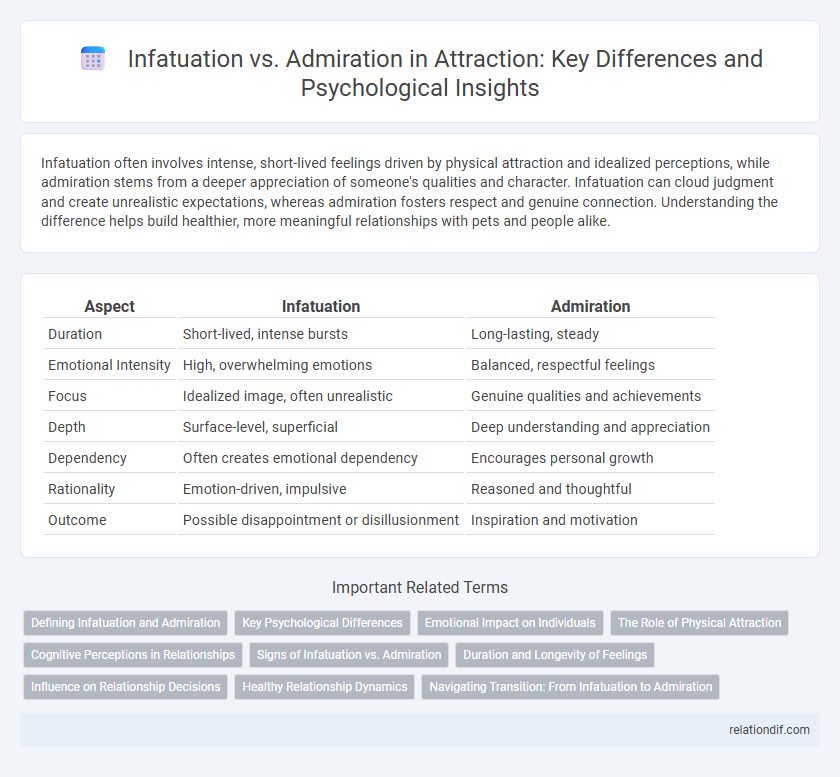Infatuation often involves intense, short-lived feelings driven by physical attraction and idealized perceptions, while admiration stems from a deeper appreciation of someone's qualities and character. Infatuation can cloud judgment and create unrealistic expectations, whereas admiration fosters respect and genuine connection. Understanding the difference helps build healthier, more meaningful relationships with pets and people alike.
Table of Comparison
| Aspect | Infatuation | Admiration |
|---|---|---|
| Duration | Short-lived, intense bursts | Long-lasting, steady |
| Emotional Intensity | High, overwhelming emotions | Balanced, respectful feelings |
| Focus | Idealized image, often unrealistic | Genuine qualities and achievements |
| Depth | Surface-level, superficial | Deep understanding and appreciation |
| Dependency | Often creates emotional dependency | Encourages personal growth |
| Rationality | Emotion-driven, impulsive | Reasoned and thoughtful |
| Outcome | Possible disappointment or disillusionment | Inspiration and motivation |
Defining Infatuation and Admiration
Infatuation is an intense but short-lived passion often driven by idealized perceptions and emotional excitement rather than deep understanding. Admiration involves a profound respect and appreciation for someone's qualities, achievements, or character, grounded in reality and lasting over time. Distinguishing between infatuation and admiration helps clarify the nature of attraction by identifying whether emotions are fueled by idealization or genuine recognition.
Key Psychological Differences
Infatuation often involves intense, immediate emotional arousal and idealization of another person, driven by physical attraction and fantasy. Admiration is characterized by a deep respect and appreciation based on the admired person's qualities, achievements, or character, fostering a stable and rational emotional connection. Key psychological differences include infatuation's impulsivity and emotional volatility versus admiration's thoughtful, enduring regard.
Emotional Impact on Individuals
Infatuation generates intense, often overwhelming emotional responses characterized by obsessive thoughts and heightened physical sensations, which can cloud judgment and lead to impulsive behavior. Admiration fosters a more balanced emotional state, promoting respect and inspiration without the destabilizing effects of infatuation, allowing individuals to appreciate qualities from a place of clarity. The emotional impact of infatuation is typically short-lived and volatile, while admiration tends to produce long-lasting, positive emotional growth and stability.
The Role of Physical Attraction
Physical attraction plays a crucial role in infatuation, often sparking intense but short-lived feelings driven by immediate visual appeal and desire. In admiration, physical attraction may be present but is typically overshadowed by deeper appreciation of character, talents, and values, leading to more enduring respect and emotional connection. Understanding the distinction between surface-level physical allure in infatuation and the holistic appreciation in admiration helps clarify the nature and longevity of attractive feelings.
Cognitive Perceptions in Relationships
Infatuation often involves intense, idealized cognitive perceptions that exaggerate a partner's positive traits while minimizing flaws, leading to a transient, emotionally charged attachment. Admiration in relationships reflects a balanced cognitive appraisal, recognizing both strengths and weaknesses with genuine respect, fostering sustainable emotional bonding. These distinct cognitive frameworks influence relationship stability, with infatuation driven by emotional intensity and admiration grounded in realistic understanding.
Signs of Infatuation vs. Admiration
Infatuation is characterized by intense, obsessive thoughts, rapid emotional highs, and idealization of the person, often ignoring their flaws. Admiration involves a deep respect and appreciation for someone's qualities or achievements, fostering stable, thoughtful feelings without overwhelming emotional intensity. Signs of infatuation include impulsive behavior and constant preoccupation, whereas admiration shows in consistent support and recognition of the person's true character.
Duration and Longevity of Feelings
Infatuation is characterized by intense, short-lived feelings that often fade quickly, whereas admiration tends to develop gradually and sustain over a longer period. Infatuation is driven by idealized perceptions and emotional intensity, making it transient and volatile. Admiration, grounded in respect and genuine appreciation, promotes enduring emotional connections and deeper relational stability.
Influence on Relationship Decisions
Infatuation often leads to impulsive relationship decisions driven by intense emotions and idealized perceptions, which can obscure long-term compatibility. Admiration encourages thoughtful evaluation of a partner's values, skills, and character, promoting more stable and sustainable relationship choices. Understanding the distinction between infatuation and admiration helps individuals make informed decisions that foster lasting emotional connections.
Healthy Relationship Dynamics
Infatuation often involves intense emotions based on idealized perceptions, while admiration is rooted in recognizing genuine qualities and strengths. Healthy relationship dynamics emerge from admiration, where respect, trust, and emotional understanding create a stable foundation. Cultivating admiration over infatuation promotes long-term connection and emotional resilience.
Navigating Transition: From Infatuation to Admiration
Navigating the transition from infatuation to admiration involves recognizing the shift from intense, often superficial emotions to a deeper appreciation based on genuine qualities and values. Infatuation tends to be driven by idealized perceptions and emotional highs, while admiration develops through understanding, respect, and acknowledgment of a person's true character and actions. Cultivating mindfulness and open communication aids in fostering this transition, allowing attraction to evolve into a more meaningful and enduring connection.
Infatuation vs admiration Infographic

 relationdif.com
relationdif.com